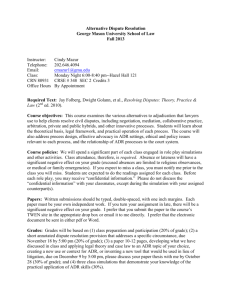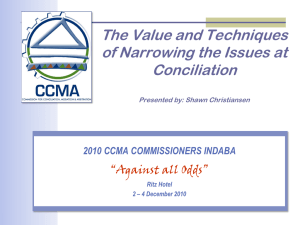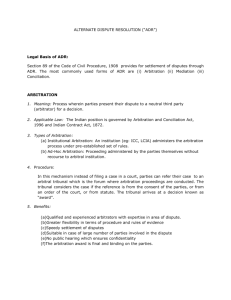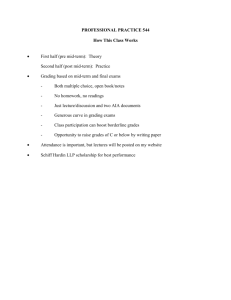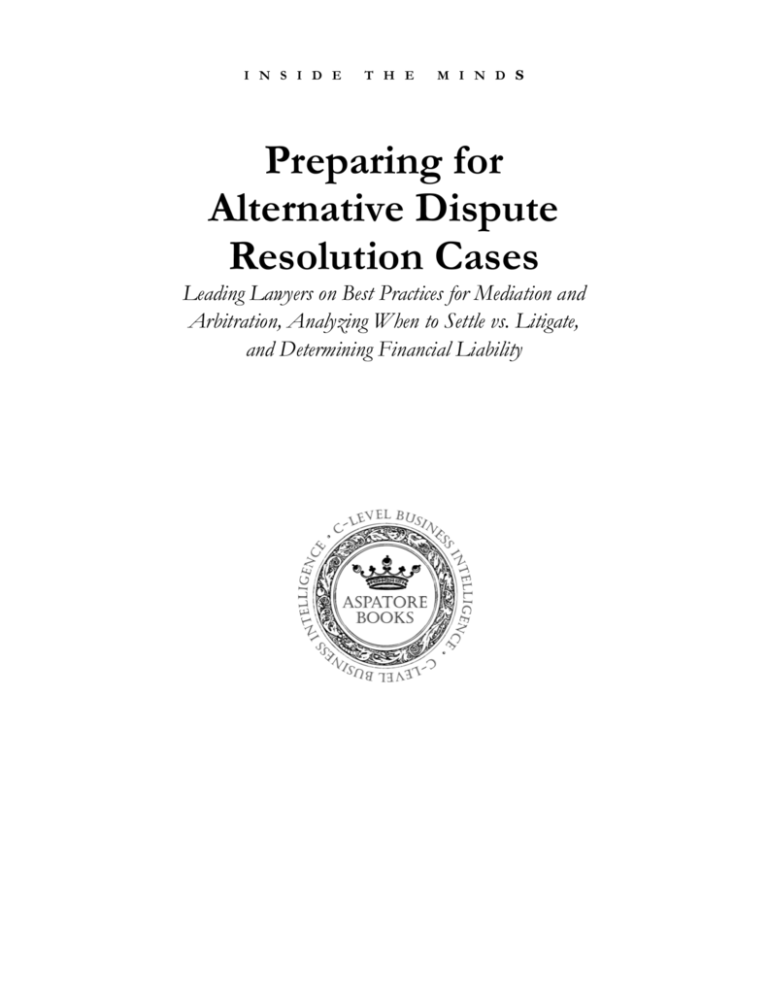
I N S I D E
T H E
M I N D S
Preparing for
Alternative Dispute
Resolution Cases
Leading Lawyers on Best Practices for Mediation and
Arbitration, Analyzing When to Settle vs. Litigate,
and Determining Financial Liability
BOOK & ARTICLE IDEA SUBMISSIONS
If you are a C-Level executive, senior lawyer, or venture capitalist interested in
submitting a book or article idea to the Aspatore editorial board for review,
please email authors@aspatore.com. Aspatore is especially looking for highly
specific ideas that would have a direct financial impact on behalf of a reader.
Completed publications can range from 2 to 2,000 pages. Include your
book/article idea, biography, and any additional pertinent information.
WRITING & EDITORIAL ASSISTANCE
In select instances Aspatore will assist in helping our authors generate the
content for their publication via phone interviews. Aspatore editors create
interview questions that help generate the main content for the book or
article. The content from the phone interviews is then transcribed and edited
for review and enhancement by the author. If this method could be of
assistance in helping you find the time to write an article or book, please email
editorial@aspatore.com for more information, along with your biography and
your publication idea.
Copyright © 2007 by Aspatore, Inc.
All rights reserved. Printed in the United States of America.
No part of this publication may be reproduced or distributed in any form or by any means, or stored in a database or
retrieval system, except as permitted under Sections 107 or 108 of the U.S. Copyright Act, without prior written
permission of the publisher. This book is printed on acid free paper.
Material in this book is for educational purposes only. This book is sold with the understanding that neither any of the
authors or the publisher is engaged in rendering legal, accounting, investment, or any other professional service.
Neither the publisher nor the authors assume any liability for any errors or omissions or for how this book or its
contents are used or interpreted or for any consequences resulting directly or indirectly from the use of this book. For
legal advice or any other, please consult your personal lawyer or the appropriate professional.
The views expressed by the individuals in this book (or the individuals on the cover) do not necessarily reflect the
views shared by the companies they are employed by (or the companies mentioned in this book). The employment
status and affiliations of authors with the companies referenced are subject to change.
Aspatore books may be purchased for educational, business, or sales promotional use. For information, please email
store@aspatore.com or call 1-866-Aspatore.
ISBN 978-1-59622-747-7
Library of Congress Control Number: 2007927468
For corrections, updates, comments or any other inquiries please email editorial@aspatore.com.
First Printing, 2006
10 9 8 7 6 5 4 3 2 1
If you are interested in purchasing the book this chapter was originally included in,
please call 1-866-Aspatore (277-2867) or visit www.Aspatore.com.
Domestic and International
ADR Processes
Alexander S. Vesselinovitch
Partner
Katten Muchin Rosenman LLP
Inside the Minds – Published by Aspatore Books
In my role as an alternative dispute resolution (ADR) attorney, I primarily
handle domestic arbitrations in civil law disputes involving breach of
contract, licensing agreements, and joint venture disputes. From time to
time I am also called upon to handle international arbitrations in civil law
disputes involving multi-national parties. In addition, I often counsel clients
who are looking to draft and incorporate dispute resolution clauses into
their domestic and international contractual agreements. These clients often
want to know what options are available to them in terms of ADR
organizations, and what types of dispute resolution clauses would typically
lead to either mediation or arbitration.
I believe that the greatest value that I bring to my clients lies in the fact that
I know a great deal about the different options that ADR organizations
bring to the table in terms of their procedures, reputations, and the quality
of their rosters of arbitrators and mediators. Much of that experience and
knowledge derives from my practice, as well as my involvement with the
American Bar Association’s International Section with respect to the
International Commercial Dispute Resolution Committee. I have also
gained a great deal of knowledge from giving speeches on ADR options
and from attending meetings of various international arbitration
organizations.
Components of ADR
The two main components of ADR are mediation and arbitration. Which
one is chosen often depends on whether or not the parties to a contract,
which may lead into a dispute, want to mediate the dispute prior to
arbitrating it. Mediation provides an opportunity to settle the dispute on an
expeditious and inexpensive basis before the parties turn to the far more
expensive process of arbitration. Another very important component of the
ADR process is discovery. Discovery includes the production of documents
and, in some cases, the taking of sworn statements or depositions of key
witnesses. In ADR, the scope of discovery is generally very limited, so the
parties must draft a clause that gives them the right to more expansive
discovery proceedings if they wish. Generally speaking, arbitration rules and
procedures limit discovery; indeed, some of them almost abolish it because
the most expensive part of litigation is usually incurred in an extensive and
Domestic and International ADR Processes
burdensome discovery process. A very important consideration in the ADR
process is the degree of discovery, if any, that the parties want to be able to
have in ADR. A party to a contract must try to predict whether they will be
advantaged, or disadvantaged, by limited discovery should a dispute arise
from the contract.
Another component of the ADR process is the various options that are
available in multi-national arbitrations. Clients need to know the differences
between the rules and default procedures of the various international
arbitration organizations such as the International Chamber of Commerce
(ICC), the SCC (Stockholm Chamber of Commerce Arbitration Institute),
or the London Court of International Arbitration (LCIA).
Successful Strategies
A critical strategy for success in this practice area involves making sure that
the client drafts the appropriate ADR clause in their contract. For example,
they need to determine whether they want one or three arbitrators; whether
they want mediation to precede arbitration; and what the applicable choice
of law is. One arbitrator may be sufficient for disputes where the amount in
controversy is $1,000,000 or less, and the choice of substantive law can be
crucial in determining the outcome of the dispute. All of those
considerations are important
In addition to counseling clients in those areas, we also advise clients as to
whether it may be better to litigate a claim as opposed to arbitrating it in
certain instances; in other words, we evaluate the strategies for the types of
cases or disputes that are more conducive to arbitration versus those that
may be better resolved through litigation. International disputes between
multi-national parties may be particularly well suited to arbitration because
the parties can choose a neutral forum and neutral arbitrators to adjudicate
the matter. We do not recommend that every client arbitrate every kind of
dispute; indeed, more than half of my practice is in litigation, and the rest is
in ADR.
In order to achieve success in ADR, it is critical to choose the right
arbitrator or arbitrators to adjudicate the dispute. The quality of an
Inside the Minds – Published by Aspatore Books
arbitration proceeding is only as good as the arbitrator or arbitrators who
preside over it; therefore, we make every effort to become very familiar
with the reputations and experience of arbitrators, as well as those who
have a specialty for handling certain types of disputes over others. Unlike
litigation where judges have a more general knowledge of the matters in
dispute, arbitrators such as engineers can be chosen for their specialized
backgrounds in the field that is the subject of the dispute. The successful
practice of ADR also depends on staying on top of your knowledge in this
practice area. I read various journals that are published by arbitration
organizations such as the ICC, LCIA, and SCC. I strive to stay up to date
on the more recent changes and revisions to the arbitration rules; I attend
an annual meeting of international and domestic arbitrators where recent
developments in arbitral rules and proceedings are covered.
The Art of Negotiation in International ADR
Perfecting the art of negotiation in ADR proceedings involves having a full
command of the facts of the case and having an equal command of the
applicable law. You must also follow the arbitration organization’s
procedural rules meticulously. In other words, you must make certain that
you are familiar with the procedural rules that apply, know what choice of
law applies to the dispute at hand, and become familiar with that law as it
pertains to the facts. For example, if you are dealing with an international
dispute, and the applicable law derives from a foreign jurisdiction or
territory, then hiring and consulting with lawyers from that jurisdiction to
provide opinions and input on their own substantive law is critical. If the
law of Germany applies to the dispute, then a German attorney should be
brought in to assist with the case.
Indeed, international negotiation strategies are somewhat unique to the
extent that you have to be familiar with the cultural and attitudinal
differences that foreign lawyers bring to the table. American litigators are
very aggressive in their presentations and positions, but that style may be
counterproductive in an international arbitration or before a multi-national
arbitral panel. Our normal way of doing things as American litigators can be
viewed as rude or even coarse by foreign arbitrators or attorneys. Often the
best way to handle these concerns is to retain or hire a lawyer from your
Domestic and International ADR Processes
opponent’s jurisdiction; he or she can help you become familiar with the
habits and patterns of negotiation that they are accustomed to. It is often
much more difficult to negotiate with parties from Japan, for example, than
it would be to negotiate with parties from England because one culture may
have a more indirect and subtle way of negotiating disagreements.
Mediation Strategies
Mediation requires a unique negotiation strategy. I believe that it is very
important to give a succinct and powerful statement to the mediator
because mediation is usually a short and quick process, although that can be
very difficult to do when you are dealing with a complex case that involves
tons of facts, witnesses, and information. Indeed, it can be very challenging
to distill a great deal of information into a simple and direct form that can
be put into a very short memorandum. However, meeting that challenge
successfully is very important and key to any successful mediation. Good
lawyers can boil down complex facts to simple form.
Success in mediation also depends on whether both sides want to be there.
If one side or the other does not really want to mediate the case, then that is
generally a recipe for disaster. Mediations work best when both sides enter
into the process with the attitude that they want to settle or reach
resolution.
It is also important to maintain one’s credibility with the mediator at all
times. You need to make sure that you are as straightforward as you can be
with the mediator. At the same time, you need to make sure that if some
information, including the maximum amount that your client will accept or
pay in settlement, is to be kept private by the mediator and not to be
disclosed to the other side during the course of mediation, that you make
that position very clear.
The lawyer is typically the advocate and the principle negotiator on behalf
of his or her client in the mediation process. While the client is generally
there as well and should play a role in approving the ultimate terms for a
settlement, their role is usually secondary to that of their advocate. Indeed, I
believe that in any form of ADR negotiations the principle attorney for the
Inside the Minds – Published by Aspatore Books
client should be the main talking head, and usually is.
Benefits of the ADR Process
Preparing for negotiations in ADR is typically less formal than it is for
litigation, and should be. Indeed, a major benefit of mediation is that the
attorney can be more candid at times than he or she would be in litigation
or even arbitration. There is a very different human dynamic involved in
mediation because it is a non-binding process; the parties recognize that is
so, and the mediator is merely there to assist them in reaching a resolution
on their own.
Arbitration, on the other hand, is a binding process. The arbitrator or
arbitrators are there to adjudicate the dispute and everyone who is involved
treats the process much more like a judicial proceeding than is the case in
mediation, which lends itself to a less formal and possibly even more candid
approach.
At the same time, there are significant benefits to engaging in ADR in
international disputes rather than engaging in international litigation. Most
importantly, the parties can choose a neutral site to arbitrate their dispute,
so that the proceedings will not take place on the home turf of either one
side or the other. As a result, you will not feel as though you are at a
disadvantage because you are adjudicating the dispute in the other side’s
home court. Both sides can control the applicable law and choose the
arbitrators who will resolve the dispute, whereas in litigation you cannot
choose the judge you end up with.
As a result, the parties in international arbitration typically have more
confidence that the outcome and process will be fair, which is important
when you are trying to avoid a situation where one side or the other might
be favored simply because they happen to be of the same nationality as the
judge of the court in which they are situated.
Drawbacks to International ADR
One major drawback to the international ADR process, however, is that
Domestic and International ADR Processes
you typically do not have a right to appeal. Indeed, the rights to appeal are
very limited in arbitration and many clients are uncomfortable with the
dilemma that if they get a bad or poorly reasoned decision, there is very
little relief.
Another disadvantage of international ADR is the limited scope of
discovery; one has a much greater ability to include discovery and thus
submit a wider range of evidence in litigation than one can in arbitration.
Therefore, you often must go blindly into the arbitration process whereas in
litigation you can uncover evidence more fully through a discovery process
that has a much wider scope.
Indeed, in cases where you are representing a party that really needs witness
testimony and numerous exhibits in order to support their claim, as in a
case where the opposing party worked a deception or a fraud, then you are
much better off litigating, because in arbitration there is no assurance that
you will be able to introduce any or most of the exhibits you need. In
addition, there are generally no depositions allowed in international or even
domestic arbitrations so if you want depositions you are much better off
litigating. Finally, if you want to preserve your right to appeal a decision,
that right to appeal is much better served in litigation than in arbitration.
It should also be noted that the most widely misunderstood aspect of
international ADR is that it is cheap. In fact, it can be very expensive, partly
because in any major international arbitration the parties are paying not only
their own attorney’s and counsel fees, they are also paying the arbitrator’s
costs, which are generally shared, not to mention the travel and other
expenses that often attend an international arbitration proceeding. Clients
must also be aware that arbitrators generally have the right to shift the fees
and costs, which is not the case in litigation. Therefore, the client can be
exposed to the risk of paying not only their attorney’s fees but the other
side’s attorney’s fees, depending on the outcome of the award—and that
can be significant.
Inside the Minds – Published by Aspatore Books
ADR Contract Language
In order to ensure that the proper form of ADR will be used to resolve any
potential dispute, the parties to a contract must include a dispute resolution
clause that explicitly chooses mediation or arbitration as the form of ADR
that will be used to resolve any future disputes. If arbitration is chosen, the
clause must also explicitly choose the ADR organization and the applicable
rules of that organization that will apply to any and all disputes arising from
the contract. The parties should also choose the location of the arbitration;
whether they want one or three arbitrators to adjudicate it; and they should
choose the applicable substantive law that should apply to the dispute.
In many cases, the parties to an international contract will agree to
arbitration over mediation because it is binding and they know they are
going to get a final decision one way or the other that will resolve the case.
In mediation, however, there is absolutely no guarantee that the dispute will
be resolved, or that any dispute will be adjudicated, because mediation is
non-binding. In essence, there is no certainty if you go to mediation that
your dispute will be settled. With arbitration you have the certainty that
there is a mechanism in place to resolve the dispute one way or the other.
If a dispute does in fact arise under a contract that has an arbitration clause,
you have to abide by that clause, and follow the rules of the ADR
organization that has been selected in the contract. It is important to
become completely familiar with that ADR organization’s rules before you
go forward, in order to comply with all the necessary steps to initiate or
defend arbitration under the rules and procedures which govern the dispute
in the contract.
Stages of an Arbitration Proceeding
An international arbitration proceeding follows several stages. Once you
have ensured that you are abiding by the chosen arbitration organization’s
rules for making a timely and formal notice of a claim, you should also then
determine that you are drafting the claim appropriately in the manner
required by the rules you have chosen. A careful review of the international
Domestic and International ADR Processes
arbitration organization’s procedures and rules is a critical predicate to any
successful arbitration.
Next, you must go through the standard procedures to choose your
arbitrators or single arbitrator, as the case may be, in a way that complies
with the rules, but also results in selecting the highest quality arbitrator or
arbitrators to preside over the dispute. Indeed, there is nothing more
important in my mind than choosing the appropriate arbitrator or
arbitrators to preside over the dispute. This can be accomplished by
speaking to other lawyers or advocates who either know or who have
appeared before the arbitrator.
You must then hold a meeting or initial conference for scheduling the
arbitration proceedings; that meeting may take place in person or by
telephone. This meeting is followed by preparation of the arbitration brief
or memorandum that is required by the arbitrators. This brief or summary
of the dispute, which addresses the claims at issue, is probably the most
important document that you are going to prepare in the case. It must
provide a full overview of the claims and issues to be resolved in the
arbitrations, and no claims should be omitted.
Laws Governing International Arbitration Procedures: Present and
Future Trends
The Federal Arbitration Act, often known as the New York Convention, is
probably the most important law governing arbitration in the U.S. It is a
formal statutory recognition, which has been upheld by the Supreme Court,
that foreign arbitral awards will be enforced by the U.S. district courts
under the proper circumstances. In essence, the New York Convention
gives teeth to the enforceability of foreign arbitration awards in U.S. federal
courts. It is very important for every company to determine in advance of
international arbitration whether the opposing party is a resident or citizen
of a nation state that is a signatory to the New York Convention; otherwise
you cannot guarantee enforceability of the arbitral award.
The New York Convention is essentially the result of a steady trend in the
U.S. courts towards enforceability of international arbitral awards. The U.S.
Inside the Minds – Published by Aspatore Books
federal courts are very deferential to arbitration clauses; U.S. case law
supports that deference to arbitration. The U.S. district courts are
disinclined to allow parties to litigate claims where they have previously
chosen an arbitration clause to do so; therefore, they are favorably inclined
to enforce arbitration clauses, and even to enforce foreign arbitral awards
that fall within the scope of the New York Convention. This is certainly a
positive trend, because when parties choose arbitration clauses as a way to
resolve a dispute they want certainty and enforceability.
In the future, our U.S. court system will likely be embracing arbitration in
many ways. Our arbitration-friendly judiciaries seem to be looking for new
ways to enforce arbitration clauses and make parties abide by them.
Success in ADR: Final Thoughts
The three most important areas that make a successful ADR attorney
include being familiar with the arbitration rules and procedures; knowing
the differences between arbitration and litigation; and becoming familiar
with the quality arbitrators who are available.
A successful ADR negotiation is one whereby the dispute is resolved; the
parties reach a settlement of the claims; and they do not need to litigate or
arbitrate the matter any further. In order to reach such a conclusion in an
arbitration matter, I always advise my clients to be careful what they wish
for. They have to decide going forward what they really expect from the
proceeding; they have to determine how much discovery they want versus
how much is available under the arbitrator’s rules; and they have to know
that arbitration is a final and binding process, one that more likely than not
cannot be challenged effectively by judicial review or post-arbitral award
review—indeed, it is sometimes an all-or-nothing proposition. Once you
entrust the case to arbitration, you are going to have to comply with the
decision that results from the process.
Alexander S. Vesselinovitch practices civil and criminal litigation, including breach of
contract, anti-fraud, health care, and antitrust. Further, he handles domestic and
Domestic and International ADR Processes
international commercial arbitration matters involving various contractual and licensing
disputes.
Mr. Vesselinovitch has handled a variety of complex cases involving both the presentation
and defense of civil RICO, fraud, antitrust, and health care claims. He also has
extensive experience conducting internal corporate investigations involving serious
allegations of misconduct.
Mr. Vesselinovitch served as a law clerk to Judge Charles P. Kocoras, U.S. District
Court for the Northern District of Illinois from 1980 to 1982. Mr. Vesselinovitch then
worked in the criminal division of the United States Attorney's office, Northern District
of Illinois, where he was deputy chief, Criminal Receiving and Appellate Division, and he
also served as deputy chief of the Organized Crime Narcotics Task Force. He was lead
counsel in numerous complex and multi-defendant trials involving fraud, banking, health
care, organized crime, and public corruption. Mr. Vesselinovitch received the Attorney
General's Special Commendation Award, September 1987, and he received the
Department of Justice Special Achievement Award in August 1988. He is recognized as
a 2007 Illinois Super Lawyer.
Mr. Vesselinovitch is a member of the American Bar Association, where he serves as vice
chair of the International Commercial Dispute Resolution Committee of the ABA
Section of International Law. He is admitted to practice in Illinois and before the U.S.
Supreme Court, the U.S. Court of Appeals 7th Circuit, the U.S. District Court for the
Northern District of Illinois, including the Trial Bar, and the U.S. District for the
Central District of Illinois. Mr. Vesselinovitch is proficient in Russian and SerboCroatian.
Mr. Vesselinovitch received his B.A. from the University of Chicago and his J.D. from
the Columbia University School of Law.
www.Aspatore.com
Aspatore Books is the largest and most exclusive publisher of C-Level
executives (CEO, CFO, CTO, CMO, Partner) from the world's most
respected companies and law firms. Aspatore annually publishes a select
group of C-Level executives from the Global 1,000, top 250 law firms
(Partners & Chairs), and other leading companies of all sizes. C-Level
Business Intelligence™, as conceptualized and developed by Aspatore
Books, provides professionals of all levels with proven business
intelligence from industry insiders – direct and unfiltered insight from
those who know it best – as opposed to third-party accounts offered by
unknown authors and analysts. Aspatore Books is committed to
publishing an innovative line of business and legal books, those which
lay forth principles and offer insights that when employed, can have a
direct financial impact on the reader's business objectives, whatever they
may be. In essence, Aspatore publishes critical tools – need-to-read as
opposed to nice-to-read books – for all business professionals.
Inside the Minds
The critically acclaimed Inside the Minds series provides readers of all
levels with proven business intelligence from C-Level executives (CEO,
CFO, CTO, CMO, Partner) from the world's most respected companies.
Each chapter is comparable to a white paper or essay and is a futureoriented look at where an industry/profession/topic is heading and the
most important issues for future success. Each author has been carefully
chosen through an exhaustive selection process by the Inside the Minds
editorial board to write a chapter for this book. Inside the Minds was
conceived in order to give readers actual insights into the leading minds
of business executives worldwide. Because so few books or other
publications are actually written by executives in industry, Inside the
Minds presents an unprecedented look at various industries and
professions never before available.
www.kattenlaw.com
401 S. Tryon Street
Suite 2600
Charlotte, NC 28202-1935
704.444.2000 tel
704.444.2050 fax
525 W. Monroe Street
Chicago, IL 60661-3693
312.902.5200 tel
312.902.1061 fax
5215 N. O’Connor Boulevard
Suite 200
Irving, TX 75039-3732
972.868.9058 tel
972.868.9068 fax
1-3 Frederick’s Place
Old Jewry
London EC2R 8AE
+44.20.7776.7620 tel
+44.20.7776.7621 fax
2029 Century Park East
Suite 2600
Los Angeles, CA 90067-3012
310.788.4400 tel
310.788.4471 fax
575 Madison Avenue
New York, NY 10022-2585
212.940.8800 tel
212.940.8776 fax
260 Sheridan Avenue
Suite 450
Palo Alto, CA 94306-2047
650.330.3652 tel
650.321.4746 fax
1025 Thomas Jefferson Street, NW
East Lobby, Suite 700
Washington, DC 20007-5201
202.625.3500 tel
202.298.7570 fax
Katten Muchin Rosenman LLP is a Limited Liability Partnership including Professional Corporations. London Affiliate: Katten Muchin Rosenman Cornish LLP.



